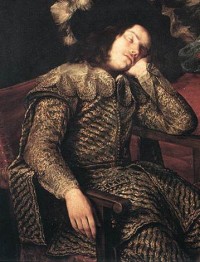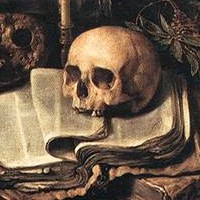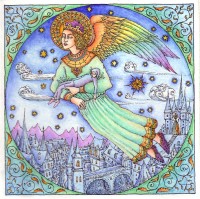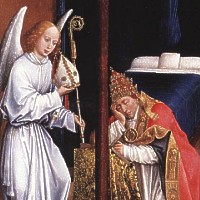Hermetic Dreaming
Dreams in Western Esotericism and Lucid Dreaming



When I first began the study of magic, my teacher, along with copious readings of classics like Cornelius Agrippa's magnum opus Three Books of Occult Philosophy, set me to work learning palmistry, prestidigitation/stage magic, mesmerism/hypnosis, and physiognomy, which is the art of reading character by appearance.
Despite their seeming rather musty and Victorian I set to work practicing these varied fields, though in the end none of them took. Still, my teacher was on to something. To advance and learn in the study of esoteric knowledge, it is necessary to do more than merely accumulate intellectual knowledge, one must work practically. To mix metaphors, one must get their hands dirty and their feet wet, and actually put their occult knowledge into practice.
One area that I eventually found to be quite useful was that of lucid dreaming. A lucid dream is quite simply a dream in which the dreamer knows he is dreaming. The level of awareness can vary from simply knowing that one is dreaming, to being able to move around or even fly in the dream, to being able to alter the dream itself.
The most famous modern authority on lucid dreaming is Dr. Stephen LaBerge who did pioneering research at Stanford University. LaBerge deserves a great deal of credit for even pursuing research into dreaming, which many scientists felt was an unworthy subject. LaBerge went further than merely research, however, and actually developed techniques for inducing lucid dreams and for working with lucid dreamers. I had two reservations about his work. Firstly, I felt that his understanding of dreaming was limited by his basic scientific approach, grounded as it was in the atheistic/materialistic modern World View.
LaBerge states, "Awareness in biological organisms is a function of the brain...the brain interprets the information and synthesizes it into a conception of what is happening in the outside world." Stephen LaBerge, Exploring the World of Lucid Dreaming (Ballantine, 1990) at 18. Consciousness is seen as a brain function, ultimately dependent on and resulting from a physical organ.
My second reservation about LaBerge's approach, enlightened as it is, is that rather mundane focus of what he suggests that lucid dreaming be used for. He has a chapter on Adventures in dreaming, somewhat like a virtual reality video game, a chapter in rehearsing for waking situations for better success, a chapter for creative problem solving in dreams, and a chapter on overcoming nightmares. Only in the last chapter, does he hint at the potential spiritual uses of lucid dreaming and the potential for spiritual exploration.
In the Western esoteric tradition and in the exoteric tradition as well up to the so-called Enlightenment, it was the brain that was dependent on the mind, not vice versa. In the Western tradition while the brain is the physical organ most involved with the mind, it is no more the ultimate source of thought than the hand is the source of writing.
The mind thinks with the brain, just as it writes with the hand. The mind itself has various components, some of which are close to being material, but others of which are spiritual. Ultimately consciousness was seen as proceeding from the soul, the Divine Spark in man. The intermediate between the divine soul and material body was the spirit or pneuma.
This middle state, neither wholly spiritual nor material, existed not only in each individual person as microcosm, but in the Macrocosm as the Celestial World and as the Imaginal World, the world where material things lose their materiality and become forms and where the spiritual things, the Platonic Ideas, take on visible form. Each of us, by virtue of our spirits, is connected to the World Spirit, just as each of us, by virtue of our souls (Latin anima) are connected to the Anima Mundi, the Soul of the World.

This explains why dreams were taken so seriously in the ancient, medieval and Renaissance worlds. The 4th century AD philosopher Macrobius, in his Commentary on the Dream of Scipio, notes that there are five types of dreams. Nightmares and apparitions, he notes, are caused by anxiety and concerns from waking life as well as physical problems like indigestion. This dream causality is as far as modern conceptions can advance because there can be, of course, no spiritual connections since the spiritual is nonexistent. Macrobius adds three more categories of dreams, the enigmatic, the oracular and the prophetic.
Through these dreams the future can be foretold.
Commentary on the Dream of Scipio, ed. Stahl
(Columbia, 1952) at 89-90. Agrippa explains that,
There is also a certain kind of
Divination by Dreams, confirmed by the
traditions of Philosophers, the authorities of Divines, the examples
of Histories, and daily experience. A Dreams I call here, not vain Dreams,
or idle imaginations: for those are vain, and have no Divination in them,
but arise from the remains of watchings, and disturbance of the body.
For as the mind is taken up about, and wearied with cares, it suggests
it self to him that is asleep. I call that a Dream here, which is caused
by the Celestiall influences in the phantastick spirit, mind, or body,
being all well disposed... Now Dreams are more efficacious, when the Moon
over-runs that Sign, which was in the ninth number of tbe Nativity, or
revolution of that yeer, or in the ninth Sign from the Sign of perfection.
Three Books of Occult Philosophy, Book I, Chapter 59.
We can either see the causation of prophetic or oracular dreams as arising from discrete spiritual beings or as a result of the spiritual connection to the Anima Mundi, in either case we can dream dreams that come true. The clarity necessary for an oracular dream has definite similarities to that of a lucid dream.
The focus in the Western tradition, therefore, has been on the oracular quality of dreams. In the field of magic there exist many spells and rituals aimed at receiving oracles in dreams. In the late classical Greek Magical Papyri appears a request for a dream oracle.
One writes a magical formula on linen and makes a wick out of the linen and lights it. One then recites the following 7 times, "...the one who shakes, who thunders, who has swallowed the serpent, surrounds the Moon, and hour by hour shakes the disk of the Sun...I ask you, lord of the gods...reveal to me the things I wish." PGM VII 359-69, Greek Magical Papyri, ed. Betz (Chicago, 1986) at 127.
Astrological magic is
particularly rich in talismans for dream incubation
with the aim of receiving oracles and occult knowledge. In Agrippa's
Three Books of Occult Philosophy, he gives a very full
list of dream inducing talismans,
"And let there be made an image of dreams, which being put under
the head of him that sleeps, makes him dream true dreams concerning
any thing that he hath formerly deliberated of; and let the figure
of that be the figure of a man sleeping in the bosome of an Angel,
which thou shall make in the Lyon ascending, the Sun keeping the nineth
house in Aries; thou shalt writ upon the breast of the man the name of
the effect desired, and in the hand of the Angel the name of the intelligence of the Sun."

"Let the same image be made in Virgo ascending, Mercury being fortunate in Aries in the ninth house, or Gemini ascending in Mercury being fortunate, and keeping the ninth house in Aquarius; and let it be received from Saturn with a fortunate aspect, and let the name of the spirit of Mercury be writ upon it."
"Let also the same be made in Libra ascending, Venus being received from Mercury in Gemini in the ninth house, by writting upon it the Angel of Venus. Besides also let the same image be made in Aquarius ascending, Saturn fortunately possessing the ninth house in his exaltation, which is in Libra, and let there be writ upon it the Angel of Saturn. "
"Moreover let it be made in Cancer ascending the Moon being received by Jupiter and Venus in Pisces, and being fortunately placed in the ninth house, and let there be writ upon it the spirit of the Moon."
"There are also made rings of dreams of wonderfull efficacy; and there are
rings of the Sun, and Saturn and the constellation of them is when the Sun
or Saturn ascend in their exaltations in the ninth house, and when the Moon
is joyned to Saturn in the ninth house, and in that signe, which was the ninth
house of Nativity; and let there be writ upon the rings the name of the spirit
of the Sun, or Saturn."
Three Books of Occult Philosophy, Bk II, ch. 50.
You can see the election, plus chart and image, plus results for a dream talisman. Plus we have available a limited number of golden bronze Sun Aries Dream talismans for visions and prophetic and lucid dreams.
In addition to the talismanic election and ritual Agrippa emphasizes that the proper physical, emotional and spiritual state must be maintained for prophetic dreaming,
"Therefore it is necessary, that he who would receive true dreams, should keep a pure, undisturbed, and an undisquieted imaginative spirit, and so compose it, that it may be made worthy of the knowledge and government by the mind and understanding: for such a spirit is most fit for prophesying, and (as Sinesius saith) is a most clear glass of all the Images which flow everywhere from all things:"
"When therefore we are sound in body, not disturbed in mind, not dulled by meat or
drink, nor sad through poverty, nor provoked by any vice of lust or wrath, but
chastly going to bed, fall asleep, then our pure and divine soul being loosed
from all hurtfull thoughts, and now freed by dreaming, is endowed with this
divine spirit as an instrument, and doth receive those beams and representations
which are darted down, and shine forth from the divine minde into it self; and
as it were in a deifying glass..."
Three Books of Occult Philosophy, Book III, Chapter 51.

I have found that talisman are indeed effective for incubating dreams of spiritual import, though I cannot claim to have prophesied the future. However, I have found lucid dreaming to be effective for an additional purpose, one that is particularly useful in for the modern Western spiritual seeker, better understanding the nature of consciousness itself. One of the techniques that LaBerge suggests and that I found particularly effective is to get into the habit of asking during one's waking life, "Is this a dream?" If this becomes habitual, then you begin asking it in the dream state and you can use it to attain lucidity, being aware of dreaming.
A closely connected insight is that our awareness and consciousness in the waking state is the same as that in the dream state. After all, what we are experiencing now is all occurring in the mind. While I may now be looking at my computer screen and feeling the keys as I type, neither the computer screen nor the keys are actually in my mind, only the senses' perceptions of them.
This is interesting at first as an intellectual puzzle, but meditated on for an extended period of time and then actually experienced in the lucid dream state and it has a much deeper and more persuasive impact. The actual experience of lucid dreaming is thus quite subversive to our model of reality.
Let me give a few of my own experiences and suggestions with regard to working with lucid dreaming. LaBerge's Exploring the World of Lucid Dreaming is quite interesting, but I think that the whole concept of "working" on lucid dreaming can be counterproductive. Trying too hard to have a lucid dream can prevent it from happening. Too much of the focus LaBerge's approach is on consciously willing and focusing on attaining this desired state of lucid dreaming.
My experience was that the technique of asking, "Am I dreaming?" and just reading about lucid dreaming was sufficient to induce lucid dreaming. As Agrippa notes, however, if I am emotionally upset or concerned, this overwhelms my ability to dream lucidly. Don't try too hard or be too concerned with results!
On the other hand, I found many of the tips LaBerge offers useful. One, made famous in the movie Waking Life, is to look at small print. In one significant lucid dream, I realized I was dreaming and confirmed it by flipping through some flash cards. The images on the cards kept shifting so I though, "Ah, see I am dreaming" I also had the presence of mind in that dream to remove my glasses and I could see just as well without them as with them, another indication of dreaming.
Iam rarely able to exercise that level of lucidity, however. Often what happens is as soon as I realize I am dreaming I immediately wake up. Frankly, many of these techniques are not that necessary for me. If I have the awareness to think to use them, I already know I am dreaming.
One of the more interesting exercises in lucid dreaming is interacting with dream characters. In one dream, perhaps quasi-nightmare, though I do not experience significant fear in my dreams, once I first started lucid dreaming, I was being followed by a two figures. As they approached they said to each other, "Do you think he will figure it out?" To which I replied, "I'm dreaming".
One might very ask what is particularly hermetic about my work with lucid dreaming. Am I simply following the usual syncretistic, buffet-style New Age methodology, a little bit of psychology and a smidgen of wisdom from the East? No, rather I am doing my best to follow exactly what is laid out in the Corpus Hermeticum the writings attributed to Hermes Trismegistus.
In the first book of the Corpus Hermeticum, entitled Poimandres, a vision appears while the narrator, is thinking of all the things that are, when his thinking soared and his senses were restrained, "...like someone heavy with sleep..." Corpus Hermeticum at 1. After seeing this great vision of the creation of existence, the narrator is told, "This is what you must know, that in you which sees and hears is the word of the lord, but your mind is god, the father...understand then the light and recognize it." Corpus Hermeticum at 2.
This is not, of course, to say that our ego mind is the One, but rather that the One dwells within us and is directly, at least potentially available to us through our minds. This is the quest of Hermetic Gnosis, not merely to study, but to authentically and completely realize our true Divine nature. Thus we must seek to press beyond our surface ego natures and its concerns.
One of my most characteristic anxiety dreams was that I was moving and I had so many possessions that I couldn't pack them all or hold onto all of them. Recently I had a dream in which I was traveling and I lost my baggage. This time, however, I gained sufficient lucidity to say, "I don't need any baggage, I don't need anything, this is a dream." Upon waking to my mundane life and worries, I thought, "if I have awoken in my dreams to this, when will I awaken to the same realization in my waking life?" This is my quest on the path of Hermetic Gnosis of which I have taken only the first dreaming step.